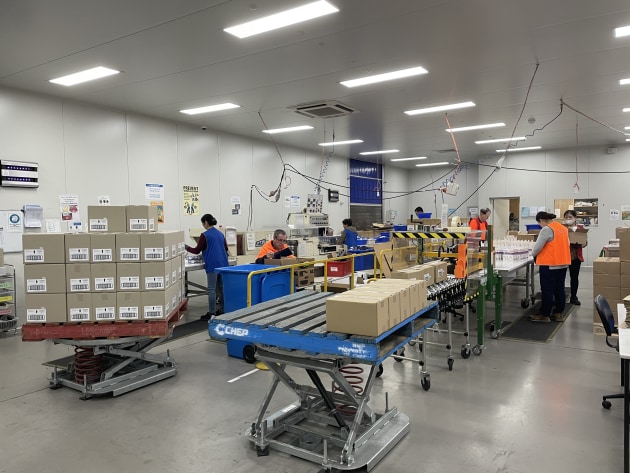Not-for-profit organisation, Access Industries, provides employment opportunities for people with disabilities. Following a half million-dollar upgrade to its secondary packaging production facility, PKN was invited for a tour.
Think safety, think quality is the slogan that adorns the wall of Access Industries packaging manufacturing facility at Seven Hills, a quiet suburb in western Sydney. “Our record for most days without any accident reports was 1335 days,” production manager Rajnesh Lal says proudly as he shows PKN around the factory floor.
Of the company’s several sites dotted around New South Wales, this one at Seven Hills is focused on producing secondary packaging. “We undertake contract packing for pharmaceutical companies. We are TGA licensed, veterinary licensed, licensed to do medicines and the like,” says Craig Coleman, operations manager, who goes on to explain that a lot of products which are manufactured overseas, must then be repackaged to comply with Australian standards.
And that’s where Access Industries comes in. The company offers a range of packaging services, from simple labelling, to repackaging and making complete displays.
A recent upgrade
The company’s recently upgraded facility is equipped with modern packaging equipment which can handle blister packing, skin packing, bundle wrapping and shrink wrapping. Access Industries can also supply packaging materials where required and provide temporary storage in both ambient and temperature-controlled storerooms.
The upgrade came from a half million-dollar investment, extending production lines from 12, to 15, then to 18, and has provided a two-fold expansion to the company’s main area of operation and its employment mission. The upgrade is aimed at developing capacity in line with customer demand and providing additional opportunities for training and employment placement.
What makes this company different, however, is that it is a not-for-profit, and around 50 per cent of its more than 500 staff are what they describe as ‘supported employees’, or those with a disability.
“A lot of our employees have been with us for a very long time, some up to 50 years,” Coleman adds. At the same time, he says, some employees ultimately desire to go into ‘open employment’, for which Access Industries prepares them by offering a supporting environment and the chance to integrate with non-disabled staff on the job.
Opportunities for staff
Lal says that there is a lot of on-the-job training provided, much of it through mentorship. “Our safety and training coordinator will sit down with the supported employees and ask, ‘what is your goal for this next year?’ or ‘what do you want to achieve?’, and then work with them to make a plan – whether that’s folding card, operating machines, operating pallet checks and so forth. So, we upskill our supported employees according to their abilities.”
The facility also offers Certificate III courses in Process Manufacturing, with some having completed the whole set, while others have done partial units. “That has given them a completely new skill set and understanding of how process manufacturing for packaging works,” Lal notes.
Having an excellent safety record is also down to this training. Lal talks about how staff are encouraged to report even the most minor of incidents. That record of 1335 days with no accident was eventually reset by one employee having a minor trip on a step.
The facility also tries to recycle as much waste as possible. Out back, Lal shows PKN the docking area, where there are bins for paper and plastic waste, and piles of pallets and other timber which will be recycled. He explains how they also coordinate a pickup and drop off with the same trucks to maximise efficiency. A truck may drop off a consignment of products for them to repackage, and at the same time collect some repackaged products to return to the customer.
While there are other similar factories offering employment and training opportunities to those with an impairment, Carolyn Frichot, senior marketing and communications specialist, tells PKN that what sets Access Industries apart is that the company provides packaging to big name brands.
High standards
“We are up there with the top packaging suppliers in Australia,” she says, keen to highlight that the high level of training, coupled with high staff retention rates, ensures that the packaging service the company delivers is of a high standard.
Indeed, walking around the facility, one can see familiar household brand names on the packing floor. What really stands out though, is the fact that every single employee has a big smile on their face.
“When you walk into a shop and see the work you have done, you say ‘oh my God’,” says one member of staff on the floor. It’s a busy day for her. “I can be labelling one minute, and then I can be at the back helping others. Last week I was going fifty kilometres per hour, it’s fast but I love it,” she tells me with an infectious enthusiasm.
As Coleman says, the staff continuously turn up for work every day because they feel valued. And it’s this value that makes Access Industries stand out as a place where people want to work, and where brand owners feel confident in the services on offer.
This article was first published in the September-October 2023 print issue of PKN Packaging News, p48.







